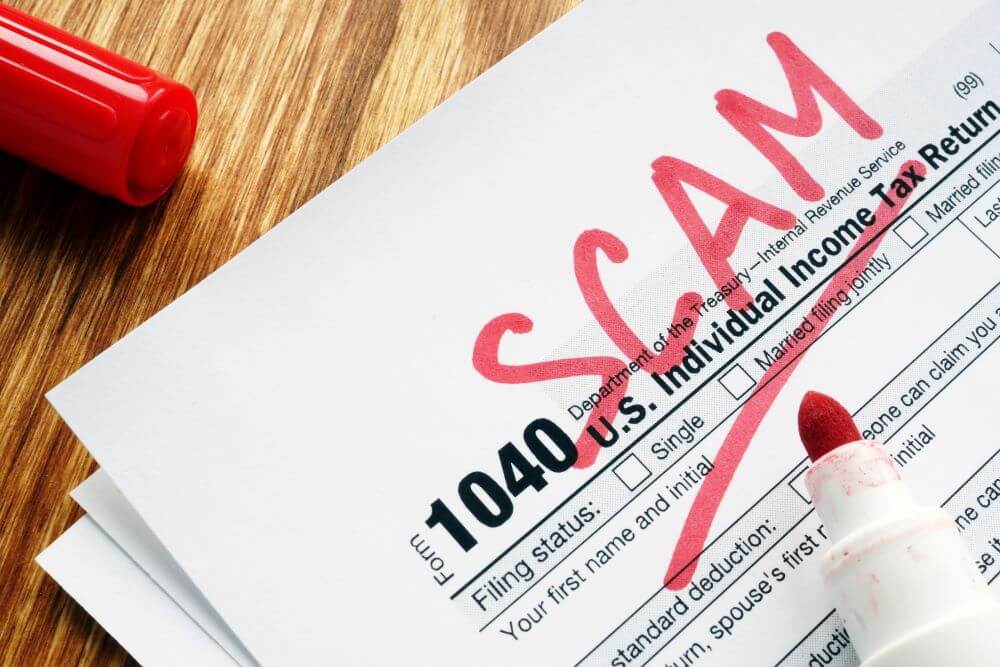Tax season is here, and watching out for common tax scams is essential. The IRS reports that tax scams have cost victims more than $23 million in the last nine years.
Here are three scams to be aware of and a few tips for how you can help avoid them.
Phone Scams
A phone scam is a common tax scam where someone calls and claims to be from the IRS.
Fraudsters use fake names and provide bogus IRS identification numbers. In addition, they use sophisticated technology to display their phone number on caller ID as if the phone call is from the IRS.
Victims are told that they owe money to the IRS. Then, they’re told that they need to pay the balance they owe via a wire transfer, prepaid debit card or gift card.
This is a common technique that scammers use. Unfortunately, recovering money converted into a gift card or prepaid debit card is challenging once the payment is sent. The same applies to a wire transfer; it’s gone once the money is sent.
These scammers tell their victims that they will be arrested, deported or have their business or driver’s license revoked if they don’t quickly pay what they owe.
Sometimes, the scammer may tell the victim they’re due a tax refund to get them to reveal private personal and financial information.
How Do You Know This is a Scam?
The IRS informs you of any money you owe via a letter or notice.
They never demand immediate payment over the phone. They don’t request you pay your balance in gift cards or a wire transfer. An IRS agent won’t make threats or harass you.
If you receive a call from someone claiming to be from the IRS stating that you owe money, hang up and initiate contact with the IRS by calling 1-800-829-1040.
If you don’t owe taxes, call 1-800-366-4484 to report this IRS impersonation scam. Or fill out a form on the Treasury Inspector General for Tax Administration web page.
Email Phishing Scams
Email phishing scams occur when a fraudster sends an email impersonating the IRS. The email from the IRS claims information about the taxpayer’s refund or tax return.
The recipient can click a link for more information about their refund or return. This link resembles an IRS webpage, but it’s a malicious file that helps the scammer download tracking software to the victim’s device.
This software is known as malware. It provides the scammers with login info and passwords to the victim’s accounts.
A variation of this scam claims to provide taxpayers with a copy of their tax transcript. However, when they click the document, it’s a malicious file.
How Do You Know This is a Scam?
The IRS doesn’t send unsolicited emails to taxpayers. They do not send sensitive information or files via email.
Don’t open any emails that claim to be from the IRS, and never click on any attachments. Instead, forward them to [email protected].
Fake Letters from the IRS
Scammers also like to impersonate IRS officials in letters. So, if you receive a letter from the IRS in your mail that seems suspicious, call the IRS, and confirm if the letter is legit before responding.
How Do You Know This is Scam?
Like phishing emails, but on paper, the scam will try to convince you it’s from the IRS with a demanding and threatening tone.
Tips for Avoiding a Tax Scam
You can do a few things to protect yourself from a tax scam.
File Your Taxes Early
Try to file your taxes as early as possible. This helps prevent a criminal from obtaining your information and attempting to file a fraudulent return in your name.
Understand How the IRS Initiates Contact
The IRS doesn’t start contact with a taxpayer by text message, email or social media page. But, occasionally, they can try to contact a taxpayer via the phone.
Utilize Identity Theft Protection
Getting identity theft protection can be beneficial if you fall victim to a scam during the tax season. IdentityIQ identity theft protection services monitor your personal and financial information and alert you of possible suspicious activity so you can act quickly.
Plans include credit monitoring, identity theft insurance underwritten by AIG and dark web monitoring to help keep your information secure. Again, this service can be beneficial if you need extra protection from a tax scam.

